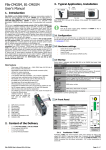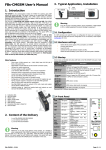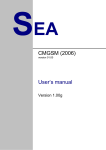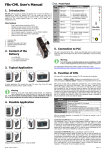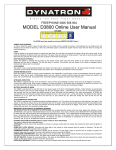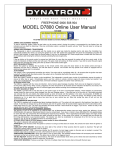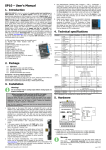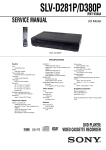Download FBs-CMGSM, B1-CMGSM User`s Manual
Transcript
3. Typical Application, Installation FBs-CMGSM, B1-CMGSM User’s Manual GSM Antenna CMGSM 1. Introduction FATEK PLC RS 232 Communication Power + 5 VDC FBs-CMGSM and B1-CMGSM (CMGSM for short) are communication modules for FATEK PLC systems FBs-xxMC and B1-xxM. CMGSM uses the GSM network to transfer the data. CMGSM is based on the quad band GSM module (850/900/1800/1900 MHz). CMGSM is backed up by Li-Ion accumulator. CMGSM offer three different ways of communication with connected PLC. The first one is monitoring and remote control of PLC via SMS. CMGSM reads periodically PLC registers containing a flag to send SMS, if the flag is set, CMGSM reads destination phone number and string of characters (text), sends SMS and clears the flag. If there is a SMS received by CMGSM, it is written into PLC registers including another flag “SMS received” to be processed by PLC program. At the end the PLC program clears this flag. So these operational SMS must be processed by PLC program both on SMS reception and SMS sending. Some status and event SMS are predefined in CMGSM (e.g. “Connection to PLC failure”) and only the destination phone number have to be set in PLC registers. The second way of communication with PLC via CMGSM is dial up data transfer via GSM network (CSD). The connection can be only incoming for CMGSM, that may be initiated from a control center for the purpose of remote system analysis and PLC software tuning and modification by WinProladder SW. The third way of CMGSM communication over the GSM network is GPRS data connection using TCP/IP protocol. CMGSM opens the connection in TCP client mode. Any SIM card, that can provide internet connection over the GSM network, can be used. CMGSM connects to IP address and port specified in from PLC. It is important to notice, that the connection can be opened in direction from CMGSM to PC (server) only. PC cannot open a connection to CMGSM because CMGSM has no server implemented and usually does not have public IP address. GPRS has special data transfer properties (data grouping, data transfer delay 1 ... 10 seconds), which are not suitable for WinProladder SW. WinProladder must use dial up data transfer (so called CSD) only. Flat cable Note: FATEK PLC is not part of the delivery of this product. It is needed to order independently. Warning Turn off all power supply during installation of CMGSM to PLC to prevent damage to equipment! 3.1 Configuration If a SIM card does not need PIN code, no configuration for basic use is necessary. For the SIM card with PIN code the configuration in PLC is necessary. Read chapter 5.1 Configuration for more. 3.2 Hardware settings Switch off the power supply of PLC Connect GSM antenna Insert SIM card Connect the flat cable between CMGSM and PLC Main features Three ways of GSM network use – SMS, GPRS, Data Call CSD (all of them practically at the same time) WinProladder remote GSM dial up data transfer connection (CSD) One digital input IN and one digital output OUT Local Time and Date (NITZ) from GSM network (if available) USB port for module monitoring (for service purposes only) Firmware update via GSM available Li-Ion backup accumulator – min. 2 days of operation w/o charging Lowest level super watchdog function (Hardware Power OFF) FBs-CMGSM can be used directly with PLC FBs-xxMC (Port 3) B1-CMGSM can be used directly with PLC B1-xxM (Port 1) SMS functionality is fully under PLC program control Configuration of CMGSM means just to set several PLC registers No PLC program support is necessary for CSD and GPRS operation LEDs for indication of the CMGSM status and data flow signalization Unlimited number of logical and analog inputs and outputs can work with one CMGSM (PLC network) 3.3 Startup Device status is indicated with blue GSM LED on the CMGSM front panel. Valid statuses are as follows: Term Description permanently off 500 ms on / 500 ms off 10 ms on / 4 s off 10 ms on / 2 s off 10 ms on / 1 s off No power or STAND BY mode. Device is not registered to the GSM network. This state occurs after start of device for approx. 30 seconds. If it remains, check: SIM card (is inserted? is active?) Antenna (is connected?) Configuration (is the SIM PIN correct?) Device is registered to the GSM network and is idle. (It means that no GPRS nor CSD connection is active.) GPRS active, data transfer in progress CSD (data connection) in progress Expressed line is common operating state. 1 8 GSM antenna connector IO connector SIM card holder USB connector DIN rail holder FUNC button Indication LEDs RCV, SEND (SMS) Flat cable for connection to PLC Indication LEDs GSM, ERR 3 7 6 2. Content of the Delivery 1 1 1 1 pc pc pc pc Name ANT GSM Element Connector LED blue ERR IO FUNC LED red Connector Button SIM CARD USB SIM card Holder Connector RCV SND LED yellow LED green 4 5 3.4 Front Panel 9 2 of FAC-FBS-CMGSM or FAC-B1-CMGSM of antenna GSM-ANT05S of 6 pin connector, pitch 3.81 mm of CD with documentation Description GSM Antenna connector GSM status (see the previous table) Error IN (input), OUT (output) Multifunction Button: DOUT2 change, RESTART, STAND BY mode. Press the SIM card to remove it from holder USB for connection to PC (for debugging purposes only) Receiving SMS from GSM Sending SMS to GSM + GSM IN ERR OUT SIM RCV USB 11 1) 2) 3) 4) 5) 6) 7) 8) 9) SND FUNC FBs-CMGSM COMMUNICATION GSM MODULE 3.4.1 Pushbutton “FUNC” Pushbutton “FUNC” has several functions. Short press changes the state of the output OUT (DOUT2). Long press (longer than 3 seconds) will either RESTART CMGSM (if CMGSM is powered by the PLC) or enter the STAND BY MODE (if the CMGSM is powered from the internal accumulator - PLC is either disconnected or turned off). FBs-CMGSM User's Manual EN v3-07.doc Page #1 of 7 3.4.2 IO Connector IO connector has 6 terminals. Terminals “+” “-”are designed to supply the input IN of internal Li-ION battery. Terminals IN (“IN1”) are for digital input. Terminals OUT (“DOUT2”) are for digital output. CMGSM *) Please, see the technical specifications for details - How does the CMGSM send a message: START GSM-PWR12 or GSM-PWR1 ? D3800 ELSE WAIT 5s 0x0001 WRITE 0x0003 INTO D3800 4V 50 Ohm + 3k9 1k READ D3810-D3819 Phone number MAX *) 35VAC/70mA 50 VDC/100mA IN INPUT (e.g. button or mg. contact) READ D3820-D3899 Text OUT SENDING OK OUTPUT (e.g.relay) ? RESULT ERROR GSM-RELE-OUT1 WRITE 0x0000 INTO D3800 WRITE 0x0004 INTO D3800 4. Function of the device 4.1 SMS One of the primary functions of the CMGSM is to send and receive SMS messages. There are 2 kinds of SMS, which have different functions and purposes: SMS for and from PLC FATEK, see chapters 4.1.1. and 4.1.2 Service SMS commands processed by CMGSM, see chapter 4.3 Outgoing SMS from PLC FATEK are sent by PLC program, that writes the text and destination phone number into PLC registers and orders CMGSM to send the message by write special value to another register (SendFlag). CMGSM sends SMS and writes result of the sending to PLC register (SendFlag). Incoming messages for PLC FATEK are received by CMGSM and the text and origin phone number are written into PLC registers. Subsequently in another register (RecvFlag) is written value, that signalizes new received SMS. PLC program analyzes the registers and deactivates flag RecvFlag. All the SMS structure and security features must be done by PLC program, including confirmation, that SMS was received, if required. SMS messages, which contains characters “#!” (hash and exclamation) followed by access code, are sent and received by CMGSM itself and their function, structure and security features cannot be changed by user or PLC program. Incoming SMS of this kind are described in chapter 4.3 Service SMS Commands and are used to get information about CMGSM status, to reset CMGSM or to get current CMGSM configuration. Outgoing SMS of this kind are described in chapter 4.5 Events. Events, it is information about emergency status of CMGSM module like lost communication with PLC. These events are sent to a predefined phone number (Master in configuration). 4.1.1 Sending a SMS CMGSM periodically tests the first register of the Send Record, standard base is D3800. The Send Record is an area in PLC registers which must be filled by program in PLC in order to send a SMS message. For structure of the record see the following table. Registers Caption Description 0x0000 – Idle 0x0001 – Command to send (written by program in PLC) 0x0003 – SMS is sending (written by D3800 SendFlag CMGSM) 0x0000 – SMS sent successfully (written by CMGSM) 0x0004 – Failed while sending SMS (written by CMGSM) Local Date and Time (NITZ) from GSM (if available – depends on GSM operator). D3801-D3809 ModemTime DateTime from modem in PLC RTC format, refresh approx. 1 per 10 sec. Phone number where to send the D3810-D3819 SendDestAddress message. Length 20 characters. Text of the message. Length 160 D3820-D3899 SendUserData characters. This range of registers cannot be used for any other purposes! FBs-CMGSM User's Manual EN v3-07.doc Every register of Phone number or Text contains two characters. String of characters ends with special character 0x00. Examples: String with one character – “A”: D3820 = 0x0041 String “TEXT”: D3820 = 0x4554, D3821 = 0x5458, D3822 = 0x0000 String “HELLO”: D3820 = 0x4548, D3821 = 0x4C4C, D3822 = 0x004F If the length of a phone number is exactly 20 characters (or 160 characters of text) then the character 0x00 at the end is omitted! Base of Send Record (D3800) may be changed to another D or R register via configuration key REGSEND. Only register SendFlag (D3800) is changed during sending a message. Example of sending a message “WE ARE THE CHAMPIONS!” to phone “123465”: (Check register D3800 – SendFlag for value 0x0000 before sending the message!) Register Value Description D3811 0x3231 0x3433 SendDestAddress, characters “1” and “2” SendDestAddress, characters “3” and “4” D3812 0x3635 SendDestAddress, characters “5” and “6” D3813 0x0000 End of string D3820 0x4557 SendUserData, characters “W” and “E” D3821 0x4120 SendUserData, characters “ ” (space) and “A” D3822 0x4552 SendUserData, characters “R” and “E” D3823 0x5420 SendUserData, characters “ ” (space) and “T” D3824 0x4548 SendUserData, characters “H” and “E” D3825 0x4320 SendUserData, characters “ ” (space) and “C” D3826 0x4148 SendUserData, characters “H” and “A” D3827 0x504D SendUserData, characters “M” and “P” D3828 0x4F49 SendUserData, characters “I” and “O” D3829 0x534E SendUserData, characters “N” and “S” D382A 0x0021 SendUserData, characters “!” and end of string D3800 0x0001 SendFlag: send command D3810 4.1.2 Receiving a SMS Incoming SMS messages are saved into registers of PLC in Recv Record, standard base D3700. Structure of the record is in following table. Registers Caption Description 0x0000 – Idle (written by PLC program) D3700 RecvFlag 0x0001 – Message received (written by CMGSM) Phone number of the message sender D3710-D3719 RecvOrigAddress (originator). Length 20 characters. Text of the message. Length 160 D3720-D3799 RecvUserData characters. This range of registers cannot be used for any other purposes! Page #2 of 7 How CMGSM stores a received message: Table of all keywords: Keyword START Message received ? D3700 ON CMGSM: NETWORK=Vodafone CZ 77% IN1=off OUT2=off CSD=no connection GPRS=no connection PLC=connected CMGSM v8.2 Device will respond with confirmation SMS and restart itself. PLC is not affected. This command is used after change of configuration in PLC register to accept the changes by CMGSM. Device will respond with current configuration. (Current configuration is a default configuration with some values changed by configuration string in PLC, see Chapter 5 – Configuration.) CMGSM will respond with confirmation SMS. CMGSM will write default configuration to attached PLC and restart itself. Activate digital output OUT2 OFF Deactivate digital output OUT2 INFO ELSE WAIT 1s STATE 0x0000 WRITE Phone number INTO D3710-D3719 RESET WRITE Text of SMS INTO D3720-D3799 CONFIG WRITE 0x0001 INTO D3700 FACTORY END Every register of Phone number or Text contains two characters. String of characters ends with special character 0x00. Examples: String with one character – “A”: D3720 = 0x0041 String “TEXT”: D3720 = 0x4554, D3721 = 0x5458, D3722 = 0x0000 String “HELLO”: D3720 = 0x4548, D3721 = 0x4C4C, D3722 = 0x004F If length of phone number is exactly 20 characters (or 160 characters of text) the character 0x00 at the end is omitted! CMGSM contains a queue of up to 100 SMS messages. After the queue is full all other SMS messages are discarded. If a power failure occurs all received messages in the queue are lost. Base of Recv Record (D3700) may be changed to another D or R register via configuration key REGRECV. No other registers are changed than the necessary ones. Example of receiving of message “TEST MESSAGE.” from phone “+420123456789”: Register Value Description D3710 0x0001 0x342B RecvFlag: new message RecvOrigAddress, characters “+” and “4” D3711 0x3032 RecvOrigAddress, characters “2” and “0” D3712 0x3231 RecvOrigAddress, characters “1” and “2” D3713 0x3433 RecvOrigAddress, characters “3” and “4” D3714 0x3635 RecvOrigAddress, characters “5” and “6” D3715 0x3837 RecvOrigAddress, characters “7” and “8” D3716 0x0039 RecvOrigAddress, characters “9” and end of string D3720 0x4554 RecvUserData, characters “T” and “E” D3721 0x5453 RecvUserData, characters “S” and “T” D3722 0x4D20 RecvUserData, characters “ ” (space) and “M” D3723 0x5345 RecvUserData, characters “E” and “S” D3724 0x4153 RecvUserData, characters “S” and “A” D3725 0x4547 RecvUserData, characters “G” and “E” D3726 0x002E RecvUserData, characters “.” and end of string D3700 Description Device will respond with SMS describing its current status, e.g. 4.2 GSM Data Connection (Data Call, CSD) Data connection can be established anytime, even if GPRS communication is in progress. Warning There is no security mechanism against unauthorized data connection to PLC. So it is highly recommended to set security in PLC (password). 4.3 Service SMS Commands Received SMS message with string ‘#!’ and password at the beginning are considered to be service SMS commands. These messages are not forwarded to PLC, but they are processed in CMGSM. Device will check for a valid access code (ACODE parameter in configuration) and if the access code is valid, the message is searched for keywords. Only one keyword in every SMS is executed. Example of this SMS: #!1234 INFO #!998877 CONFIG FBs-CMGSM User's Manual EN v3-07.doc 4.4 TCP over GPRS One of the primary functions of this device is to establish and maintain TCP connection from PLC to a server. In order to achieve this goal FBsCMGSM has to make following steps after power up: Establish connection to PLC via serial port. Parameters of the serial port are: 9600 baud, 7 data bits, EVEN parity, 1 stop bit, no hw handshake (it is default FATEK settings for all serial ports), address 01h. After power on the FBsCMGSM will proceed steps: Read configuration from PLC register D3900 – D3999. Login to the GSM network, using PIN from configuration. Attach to GPRS, using APN, USER and PASSWD from configuration. Establish and maintain TCP connection to SERVER on port PORT. CMGSM will try indefinitely to read configuration from PLC at the beginning. If there is no serial communication between CMGSM and PLC device will not login into the GSM network! If there is no configuration in PLC or the configuration is damaged or other problem occurs CMGSM writes default configuration into the PLC. GPRS can be controlled and monitored via set of registers in PLC and via configuration: Registers Caption Description 0=no connection (written by PLC) D3510 GprsCommand 1=open connection (written by PLC) 0x00=no connection, idle 0x01=connecting D3511 GprsState 0x80=connected 0x81=disconnecting D3512 GprsCntErr Error counter for connection Data counter, direction UP D3516-D3517 GprsCntUp (= PLCTCP), D3516 LSB Data counter, direction DOWN D3518-D3519 GprsCntDown (= TCPPLC), D3518 LSB Local IP address if connected. “0.0.0.0” if not connected. (D3520=MSB) Example: If local IP address is 147.32.80.1, then D3520-D3523 GprsLocalIP D3520 … 0x0093 (147d) D3521 … 0x0020 (32d) D3522 … 0x0050 (80d) D3523 … 0x0001 (1d) Local TCP port if connected, 0 if not D3524 GprsLocalPort connected Remote IP address if connected. “0.0.0.0” D3525-D3528 GprsRemoteIP if not connected. (D2425=MSB) Remote TCP port if connected, 0 if not D3529 GprsRemotePort connected This range of registers cannot be used for any other purposes! GPRS diagnostic is part of Diagnostic (see chapter Diagnostic). Base of Diag Record (D3500) may be changed to another D or R register via configuration key REGDIAG. 4.5 Events Device can detect special events and send a warning about them as a SMS: Connection to PLC failure/restore It is needed to set parameter MASTER in configuration for both of these events, see chapter 5.2 Basic Parameters. Page #3 of 7 4.6 Diagnostic Diagnostics values are written to Diagnostic Record, standard base D3500. Structure of the record is in following table: Registers Caption *1) D3500.0 DiagCnct D3500.1 DiagRQueue D3500.8-15 DiagGsmReg D3501.0-7 DiagSigQuality D3501.8-15 DiagSigErr D3502 DiagAlive D3503 DiagVersion D3504 0x0000 D3505 DiagReset D3506 DiagAtFlag D3508-D3509 DiagUpTime D3510-D3529 Gprs ... D3530-D3539 DiagOperator D3540-D3549 DiagCredit D3550-D3699 DiagAtCmd Description 0=no connection to PLC, 1=connection to PLC OK 0=no SMS in receive queue, 1=at least one SMS in receive queue result of command AT+CREG: 0=not registered, not searching 1=registered, home network 2=not registered, searching 3=registration denied 5=registered, roaming Signal quality in percent (0-100) or 255 if unknown. Signal BER (0-7) or 255 if unknown. CMGSM writes value 0x0001 whenever diagnostic record is refreshed (cca 6 seconds). This is intended for PLC program to check if CMGSM is alive. In this case PLC program will write a 0x0000 into this register and wait for 0x0001 here. Version of CMGSM3, in high byte is high version number, in low byte is low byte is low version number For future use If PLC writes value 0xF3A5 to this register the CMGSM will make reset of itself. 0x0000 – Idle 0x0001 – Execute command in DiagAtCmd (written by program in PLC) 0x0003 – Command is about to execute (written by CMGSM) 0x0000 – Command executed successfully (written by CMGSM) 0x0004 – Exception while executing the command (written by CMGSM) 32 bit counter which is incremented whenever CMGSM updates DiagRegisters area in PLC. The counter is cleared after restart of CMGSM. The counter value indicates in a certain way how long the CMGSM is running without restart (so called Uptime). Reserved for GPRS diagnostics See chapter “TCP over GPRS” for details String with name of operator when registered. Empty string if not registered. Length 20 characters. Reserved Sending AT commands to modem directly. Write a command to this place and set D3506 (DiagAtFlag) to 0x0001. Command is executed and result is placed in this place (overwriting original command). In D3506 (DiagAtFlag) is signalized end of execution. The system is the same as with sending SMS. D3801 … 0x0001=time written to PLC 0x0000=time not written, wait for 0x0001 D3802 … seconds 0-59 D3803 … minutes 0-59 D3804 … hours 0-23 D3805 … day in month 1-31 D3806 … month 1-12 D3807 … year 0-99 D3808 … day in week 0-6 D3809 … hour (MSB) + minute (LSB) This range of registers cannot be used for any other purposes! D3801-D3809 ModemTime 5.1 How to Configuration for CMGSM is located inside PLC Fatek. Range of internal PLC registers D3900 – D3999 is used. Configuration itself is a string of characters. This string is created via WinProladder (software from PLC FATEK manufacturer), see following images. This range of registers cannot be used for any other purposes! Step 1 – Right click on Table edit - ASCII Table and select “New ASCII Table” Step 2 – Enter Table Name „cfg“ and Table starting address „D3900“. Then click “OK”. *2,3) *1) Notation D3500.x means x-th bit of D3500 register. For example D3500.0 is the least significant bit in register D3500. Another example D3500.8-15 are eight most significant bits in register D3500 (high byte). Base of Diag Record (D3500) may be changed to another D or R register via configuration key REGDIAG. *2) 5. Configuration Step 3 – Enter configuration string “CMGSM3;PIN=7608;ACODE=998877;$” into field “ASCII Editor” and click on button “Output Preview”. !!! Warning: Change PIN according your real SIM card !!! ModemTime is available in CMGSM with sw. version 2.03 and higher. *3) CMGSM reads out the local Time and date (NITZ) from the GSM network (if NITZ is available depends on the GMS operator) and approx. 1 per 10 seconds sends this information do PLC registers. The format of ModemTime is similar to PLC registers in RTC (Calendar). FBs-CMGSM User's Manual EN v3-07.doc Page #4 of 7 Step 3 (GPRS) – Enter configuration string “CMGSM3;PIN=7608;APN=internet;SERVER=test.server.com;PORT=5700 ;ACODE=998877;$” into field “ASCII Editor” and click on button “Output Preview”. !!! Warning: Change PIN according to your real SIM card !!! Step 6 – Result Configuration is read after power up and only once. If you change configuration (for example by WinProladder and second serial port), it is not read automatically. You have to restart CMGSM. CMGSM will try to log in the GSM network without PIN if no configuration in PLC is found. (In this case SIM card without PIN authorization is requested.) Configuration string is very simple. For example: CMGSM3;PIN=7608;ACODE=998877;MASTER=+420777777497;$ Step 4 – Select “Non Output Format” and click “OK”. For easy understanding this string says: CMGSM3 – It is a configuration for CMGSM. PIN=7608 – PIN code of the SIM card in order to register into the GSM network. ACODE=998877 – Access code for Service SMS Commands is 998877 MASTER=+420777777497 – Warning SMS is sent to this phone number in case of any event. For example “Connection to PLC failure.” when communication between CMGSM and PLC is lost or “IN1 activated (L>H).” when digital input IN (IN1) is activated respectively “IN1 released (H->L).” when digital input IN (IN1) is deactivated. Example of configuration string for GPRS: CMGSM3;PIN=7608;APN=internet; SERVER=test.server.com;PORT=5700;ACODE=998877;$ This string means: CMGSM3 – It is configuration for CMGSM. PIN=7608 – User PIN code of ‘7608’ for SIM card in order to register into the network. APN=internet – Access Point (APN) is needed in order to use GPRS service in GSM network. In this example APN is ‘internet’. SERVER=test.server.com – It is a name of a server, to which CMGSM will connect. (Using TCP connection.) PORT=5700 – Use TCP connection to port 5700 ACODE=998877 – Access code for SMS control is 998877 Step 5 – Configuration string is now black. Click “OK”. General format of these messages is following: CMGSM3;KEY1=VALUE1;KEY2=VALUE2;...[;]$ Part ‘CMGSM3’ at the beginning of the string is mandatory. It is a stamp of validity. Acceptable keys are shown in table below. Unknown keys are ignored, no spaces are allowed inside keys or values. Order of pairs is not important. Keys are not case sensitive, values are case sensitive. Maximum length of configuration string is 200 characters. At the end of each part MUST be character ‘;’ (semicolon), after last pair MAY be character ‘;’ (semicolon) and MUST be character ‘$’ (dolar). 5.2 Basic parameters Key PIN ACODE Step 5 (GPRS) – Configuration string is now black. Click “OK”. MASTER FBs-CMGSM User's Manual EN v3-07.doc Description Default PIN code for SIM card. It may be omitted if the SIM card does not need a PIN code. But it is mandatory if <empty> the SIM card needs the PIN code. Access code for SMS control. You can send SMS message in order to control CMGSM. These SMS must 1234 begin with this ACODE. They will be ignored otherwise. Optional. Phone number, where to send SMS about important events: Connection to PLC failure. No SMS are sent if <empty> value is empty. Only one master is possible. Page #5 of 7 6. Usage scenarios for SMS 5.3 Advanced parameters Key REGSEND REGRECV REGDIAG NETRESET Description First register of the Send Record.. It is area, where PLC writes messages to send. See 4.1.1 Sending a SMS. Only D or R registers can be used. First register of the Recv Record. It is an area, where CMGSM writes received messages. See 4.1.2 Receive a SMS. Only D or R registers can be used. First register of the Diagnostic Record. It is an area, where CMGSM writes diagnostic values like operator, signal quality, … See chapter 4.4 This is a security feature. Value zero (0) in this parameters means security reset every week (7 days). If you do not want any security reset write -1 to this parameter. Default D3800 Usage examples can be found on CD with documentation or on the web pages http://fatek.seapraha.cz/. In category FAC-CMGSM are examples of programs for receiving and sending of SMS from PLC. D3700 7. Usage Scenarios for GPRS D3500 7.1 Explanation of Important Terms Term 0 GPRS 5.4 GPRS parameters TCP/IP Keys in configuration string: Key Description Default APN Access Point for GPRS. Ask your GSM provider for this value. internet USER User for APN. Mandatory is provider requires. <empty> PASSWD Password for APN. Mandatory is provider requires. <empty> SERVER Name or IP address of server, to which CMGSM will connect. TCP connection is used. Optional. <empty> PORT TCP port for connection. Optional. 5700 DNS IP address of DNS server. Optional. <empty> If SERVER is omitted no GPRS connection is made and device waits for a data CSD call only. TCP Firewall Port Description The way how to transfer data through the GSM network. It is charged according to transferred bytes (and not per minutes) and is much more suitable for remote monitoring than data connection (CSD). It is protocol which is used while communicating through GPRS. (Like Fatek protocol is used to communicate between computer and Fatek PLC). It is one of protocols in TCP/IP family used with CMGSM. It may be imagine as a bidirectional stream of bytes through the Internet and the GSM network from your computer to a Fatek PLC It is a security device. It located between you LAN and Internet. Main purpose of the Firewall is to protect your LAN against an attack from Internet. It is a number of a service in your computer. Complete address needed to connect your computer is composed from IP address and Port number and may be seen as 11.22.33.44:5700 (IPADDRESS:PORT). 7.2 Simple Use We recommend this scenario for your first step with CMGSM. 5.5 Examples of Configuration Strings Internet 5.5.1 GSM Network SIM without PIN Configuration string: CMGSM3;ACODE=998877;$ Firewall Translated for human this string says: CMGSM3 – It is configuration for CMGSM. ACODE=998877 – Access code for Service SMS Commands is 998877 LAN Your computer in LAN of your company 5.5.2 Use registers D1000-D1100 for sending SMS Configuration string: CMGSM3;PIN=7608;REGSEND=D1000;$ Translated for human this string says: CMGSM3 – It is configuration for CMGSM. PIN=7608 – PIN code 7608 for SIM card in order to register into network. REGSEND=D1000 – Begin of the Send Record. [default Access code for SMS control is 1234] 5.5.3 FBsCMGSM PWR COMM FATEK PLC You need to prepare following items in this scenario: External (WAN) IP address of your firewall. Rest of the Internet sees you with this IP. Warning: it is NOT your IP address in LAN (i.e. 10.0.0.25). Your external IP address may be obtained from various WEB sites, i.e. http://www.whatismyip.com/. A redirection of port 5700 from external side of your firewall to your computer. Cooperation of your IT department will be necessary for all of these items. We offer simple program that acts like a server. CMGSM connects to this server. This program is only a demonstration for one connection and elements X0-X3 and Y0-Y3. It may be obtained from our WEB site (www.seapraha.cz). Only CSD (without GPRS) Configuration string: CMGSM3;PIN=7608;$ Translated for human this string says: CMGSM3 – It is configuration for CMGSM. [default Access code for SMS control is 1234] 5.5.4 SIM without PIN, GPRS connection Configuration string: CMGSM3;APN=internet;SERVER=test.server.com;PORT=5700;AC ODE=998877;$ Translated for human this string says: CMGSM3 – It is configuration for CMGSM. APN=internet – Access Point (APN) is ‘internet’. SERVER=test.server.com – Connect to ‘test.server.com’ PORT=5700 – Use TCP connection to port 5700 ACODE=998877 – Access code for SMS control is 998877 FBs-CMGSM User's Manual EN v3-07.doc Details: Program listens on TCP port 5700 for incoming connection. Port 5700 is default port where CMGSM connects to. Program periodically queries status of inputs X0-X3 from remote station. You can change any of output Y0-Y3 by click on a check box Y0-Y1. Page #6 of 7 8. Technical Specifications 10. Warranty 8.1 General Parameter Width Height Depth (without antenna) Dimensions Fixing Power Backup power Number Voltage log H Voltage log L Current Number Voltage DC Digital outputs Voltage AC DC, AC Current DC Current AC Temperature Operational Humidity Operational GSM RF power GSM frequencies Digital input DC (any polarity) Antenna connector Communication interface Symbol w h d Conditions MIN. FBS-CMGSM B1-CMGSM TYP. 25 90 80 55 MAX. Unit mm mm mm mm DIN rail or flat panel screw fixing 5V DC / 120mA (max.) from power supply of PLC main unit Internal Li-Ion accumulator for 2 days working without charging. Full capacity will be after 2 day of charging. 1 |VIN| 3 12 30 VDC |VIN| <4 4 VDC IIN 5 mA 1 VOUTDC 50 8 VDC VOUTAC 35 VAC IOUTDC 100 mA IOUTAC 70 mA tA hA -20 +45 90 2 W Worldwide 850 / 900 / 1800 / 1900 MHz SMA female GSM-ANT05S recommended Flat cable connected directly to PLC FATEK: FBs-xxMC: Port 3, (Port 4*); B1-xxM Port 1, (Port 2*) 9. FAQ SEA ltd. has NO RESPONSIBILITY for any damage, lost, costs and any other problems direct or inducted, caused by such SW error, by eventual device malfunction from any reason or by undelivered SMS from the device. °C % * PLC Port is not usable, but is not is not accessible for another expansions. General warranty period is 12 months after purchase, when eventual malfunction device will be repaired free of charge in SEA company while shipping to SEA is paid by customer and SEA pays for shipping back to customer. For SW there is 24 months warranty under following conditions: Both CPU and PC software is sold “as is”. The software was created by the best software engineers in SEA and was carefully tested both in SEA and also by SEA customers using GSM applications products made in SEA. In spite of making all possible to get error free software it can happen, that the software in CPU or PC programming SW or their mutual interaction has some error under some specific conditions. If such error is found and the description of the problem including configuration file is sent by E-mail to SEA ltd., the error is removed free of charge and SEA will send new SW by E-mail to customer. CE Declaration of conformity in accordance with the Radio and Telecommunications Terminal Equipment Directive 1999/5/EC (R&TTE) and Directive 2011/65/EU (ROHS). We SEA, spol. s r.o., Dolnoměcholupská 1537/21, CZ 102 00 Praha 10, Czech Republic, ID: 47117931 (manufacturer) declare under our sole responsibility, that product equipment for remote control and monitoring type FBs-CMGSM and B1-CMGSM is in conformity with the following standards: Health and safety: EN 60 950-1 EMC: EN 61000-4-2, -3, -4, -5, -6, -8 EN 55022 radio frequency: EN 301 511 v 9.0.2 The last two digits of year in which the CE marking was affixed: 14 Place of issue: Praha Date of issue: 7.8.2014 Name: Grade: Ing. Mario Vejlupek Technical director It’s not possible to reset CMGSM using FUNC button – it’s necessary to hold the button FUNC pressed at least 2 seconds. CSD (GSM data) connection cannot be established – 1) check power supply, 2) check antenna, 3) check indication LED on device and compare it with the manual, 3) are CSD connections available on your SIM card? Ask provider, 4) check GSM signal quality on your mobile phone near the device. At least 50% signal is recommended. No reply to Service SMS Commands – 1) check the power supply, 2) check antenna, 3) check indication LED on CMGSM and compare to the manual (Note: LED RCV and SND are not used for Command SMS), 4) check configuration - is the access code ACODE correct? 5) Insert the SIM card from CMGSM to you mobile phone and try to send SMS and receive SMS and voice call. Some special characters are not correctly transported by SMS – Try to use so called 7 bit SMS (160 characters) and only basic ASCII characters (0-127) No communication with PLC – 1) check PLC power supply, 2) check Port3 (FBs-xxM) or Port1 (B1-xxM) settings using WinProladder. It MUST be 9600 7E1, address 01h. 3) Check that no Analog or Communication module is added to WinProladder project. Is it possible to use B1-CMGSM simultaneously with Analog or Communication module? – Not at the moment, but we prepare “Autodetection”. In the future B1-CMGSM will connect to PLC through Port1 or Port2 depending on usage of Analog or Communication module. GPRS connection cannot be established – 1) check power supply, 2) check communication with PLC Fatek, 3) check configuration, 4) check if it is possible from another computer connected to the Internet to connect to your server (may be firewall is wrong configured). GPRS connection is not working during CSD connection – This is the feature of GSM module. GPRS connection is restored automatically after CSD connection is finished. Communication is OK but real outputs Y0-Y3 do not reflect commands – 1) PLC FATEK must be in Run mode. Use WinProladder to run PLC. Communication is OK but inputs X1-X3 do not show correct value – 1) PLC FATEK must be in Run mode. Use WinProladder to run the PLC. Some parameters in the FATEK configuration are not functioning – Please check if there is no “$” character before these parameters (e.g. “CMGSM3;$PIN=7608; ACODE=998877;$”) because CMGSM reads the configuration till the first “$” character. FBs-CMGSM User's Manual EN v3-07.doc Page #7 of 7







